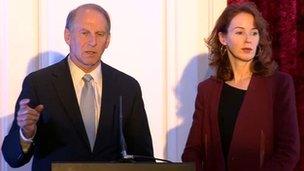Richard Haass says talks 'have real chance to succeed'
- Published

Richard Haass and Prof Meghan O'Sullivan at their press conference
Richard Haass has said he believes "there is a real chance to succeed" with the Northern Ireland inter-party talks dealing with parades, flags and the past.
He also ruled out any possibility of the talks extending beyond their deadline of the end of the year.
Dr Haass was speaking after his first round-table talks with all five executive parties.
He is flying back to the United States on Saturday and will return next month.
The US diplomat and Harvard professor Meghan O'Sullivan, who are chairing the talks, have held 30 meetings and received more than 100 submissions since Tuesday.
Dr Haass said: "I, and we, come away from this week and all these meetings with a strong sense of possibility, of what can and should be accomplished.
"Both of us leave here with somewhat more confidence than we had going in, they were good meetings this week.
'Encouraged'
"I thought both the substance and the tone of the meetings we had with a wide range of groups was encouraging.
"Based on our experience and on the quality of the conversations and also our familiarity of the issues... I believe there is a real chance to succeed. It's just that, a real chance is not a guarantee.
"Obviously it depends upon the willingness of some people to make some tough decisions and to go out and defend them.
"I can't give you odds, I don't make predictions but I would simply say that both of us are encouraged."
When they return in October they plan to hold meetings at other venues in Northern Ireland outside Belfast, as well as talks in London and Dublin.
Dr Haass added: "We will finish our work before December 31, and nothing that I've heard and nothing that I have read leads me to think that more time would result in more progress.
"I think there's more than enough time to come to a consensus, to come to agreement, if people are prepared to do so."
Prof O'Sullivan said she believed the issue of the past "will be the hardest one for us to get our arms around".
'Different models'
She said: "With parades and flags, those issues seem bounded in some way and there are only a certain number of ways in which you can look at these issues.
"The past seems to be in a different category, and that seems to be the assessment not only of ourselves but of virtually everyone we speak with.
"It is much more nebulous, it has to address a wider range of issues, and there are so many different models that can be approached that have been used here in Northern Ireland and in other parts of the world.
"We feel good about the prospects for progress on each of the three fronts, but I think the past is the one that will be the hardest one for us to get our arms around."
The DUP described Friday's talks as constructive, and Jeffrey Donaldson, the party's MP for Lagan Valley, said: "The politicians alone do not have the answers here.
"We want to hear from people across the community, their views on all of these issues so that we can take those views on board as we prepare our submissions and seek to reach agreements on what are very complex and challenging matters."
Sinn Féin said there was more agreement between the parties than people think.
'Dampen expectations'
MLA Gerry Kelly said: "We are at a fairly crucial point in the next few months. What we want to come out at the end of it is that we have made substantial progress and are moving ahead."
UUP MLA Tom Elliott said it was important to dampen public expectations.
"This is not an easy process and it would be wrong if we were to try and build the public's expectations up," he said.
Both the SDLP and Alliance said a deal must be done before the end of the year.
The SDLP's Alex Attwood said: "If we go into 2014 with the shadow of doubt and more dispute and a failure to resolve these issues that have been around now for far too long, then that will sour politics into next year."
Naomi Long, the Alliance MP for East Belfast said: "The issue is do we want to resolve the issues or do we not.
"The public is demanding that we should and I think it's up to us now to test the will in the room as to whether or not we're going to do that in the timeframe that's been set aside."
- Published19 September 2013
- Published18 September 2013
- Published19 September 2013